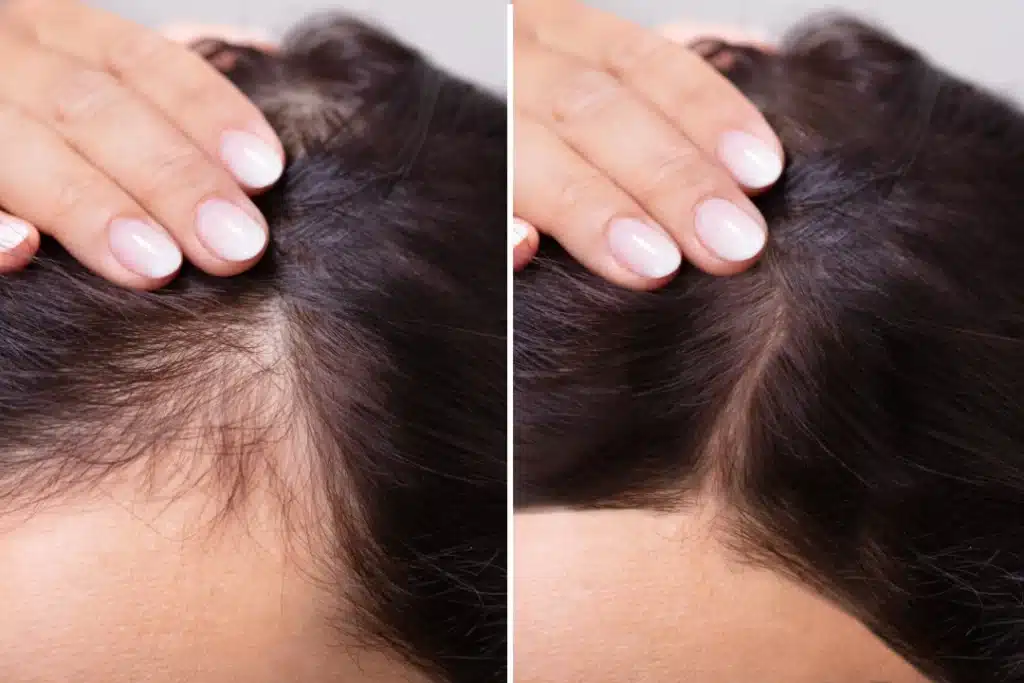Advertisement
Advertisement

While there's no magic pill for instant Rapunzel-like locks, certain supplements may help support healthy hair growth and thickness. This article will explore key nutrients linked to hair health, discuss potential causes of hair loss in women, and provide guidance on choosing the right supplements for your needs.
The Science of Hair Growth
To understand how supplements can support hair growth, let's first delve into the hair growth cycle:- Anagen (Growth Phase): This phase lasts for several years, during which hair actively grows.
- Catagen (Transition Phase): A short phase (a few weeks) where hair growth slows and the follicle shrinks.
- Telogen (Resting Phase): Hair stays in the follicle for a few months before shedding.
Key Nutrients for Hair Health
Here are some of the most important nutrients for strong, healthy hair:- Biotin: A B vitamin crucial for cell growth and the production of keratin, a key protein that makes up hair. While true biotin deficiency is rare, supplementing may help improve hair strength and thickness in those with inadequate intake.
- Zinc: Plays a vital role in cell growth and repair, including hair follicle function. Zinc deficiency can contribute to hair loss.
- Iron: Essential for carrying oxygen to hair follicles, supporting their growth and health. Iron deficiency anemia is a common cause of hair loss, especially in women.
- Vitamin D: May play a role in hair follicle cycling and growth. Research suggests a link between vitamin D deficiency and certain types of hair loss.
- Vitamin C: A powerful antioxidant that protects hair follicles from damage. It's also essential for collagen production, which supports hair structure.
- Omega-3 Fatty Acids: Found in fatty fish and supplements, these healthy fats may help nourish hair follicles and promote scalp health.
Causes of Hair Loss in Women
Several factors can contribute to hair loss in women, including:- Hormonal Changes: Fluctuations in estrogen levels during menopause, pregnancy, or thyroid disorders can trigger hair loss.
- Stress: Chronic stress can disrupt the hair growth cycle, leading to increased shedding.
- Nutrient Deficiencies: Inadequate intake of essential nutrients like iron, zinc, and biotin can affect hair health.
- Medical Conditions: Certain medical conditions like alopecia areata, thyroid disorders, and autoimmune diseases can cause hair loss.
- Medications: Some medications, including those used for cancer treatment and blood pressure, can have hair loss as a side effect.
- Styling Practices: Harsh chemical treatments, tight hairstyles, and excessive heat styling can damage hair and contribute to breakage.
Choosing the Right Supplements
When selecting hair growth supplements, consider the following:- Ingredients: Look for products containing a combination of the key nutrients mentioned above, such as biotin, zinc, iron, and vitamins C and D.
- Dosage: Follow the recommended dosage on the product label. More is not always better, and excessive intake of certain nutrients can have adverse effects.
- Quality: Choose reputable brands that prioritize quality and third-party testing to ensure purity and potency.
- Form: Supplements come in various forms, including pills, capsules, gummies, and powders. Choose a form that's convenient for you.
- Individual Needs: Consider your specific needs and any underlying health conditions. If you have any concerns, consult with a healthcare professional before taking any new supplements.
Recommended Products
Here are a few popular hair growth supplements on the market:- Nutrafol Women's Balance: Specifically formulated for women ages 45+, this supplement contains a blend of clinically-tested ingredients to target root causes of thinning hair associated with menopause and aging. These include ashwagandha to combat stress, saw palmetto to help balance hormones, and biotin to support healthy hair growth.
- Typical Price: $88 for a one-month supply.
- Best for: Women experiencing hair thinning due to hormonal changes, stress, and aging.
- Viviscal Extra Strength: This supplement combines a marine complex (AminoMar C) with biotin, zinc, and vitamin C to nourish hair follicles and promote growth. It's been clinically proven to increase hair thickness and reduce shedding.
- Typical Price: $50 for a one-month supply.
- Best for: Women with general hair thinning or those looking for a clinically-backed option.
- Hair La Vie Clinical Formula Hair Vitamins: This formula features a blend of saw palmetto, reishi mushroom, and other plant-based ingredients to support hair growth, reduce shedding, and improve hair strength.
- Typical Price: $70 for a one-month supply.
- Best for: Women seeking a natural, plant-based option to support hair health.
- Nature's Bounty Optimal Solutions Hair, Skin & Nails Gummies: These delicious gummies provide a convenient way to get your daily dose of biotin, vitamin C, and vitamin E for healthy hair, skin, and nails.
- Typical Price: $15 for a one-month supply.
- Best for: Women who prefer a tasty and easy-to-take supplement.
Beyond Supplements: Lifestyle Tips for Healthy Hair
While supplements can play a supportive role, a holistic approach to hair health is crucial. Here are some additional tips:- Eat a balanced diet: Ensure you're getting enough protein, iron, zinc, and other essential nutrients from your diet.
- Manage stress: Practice stress-reducing techniques like yoga, meditation, or deep breathing exercises.
- Be gentle with your hair: Avoid harsh chemical treatments, tight hairstyles, and excessive heat styling.
- Protect your hair from the sun: Wear a hat or use a leave-in conditioner with UV protection.
- Consult a dermatologist: If you're experiencing significant hair loss, consult a dermatologist to rule out any underlying medical conditions.